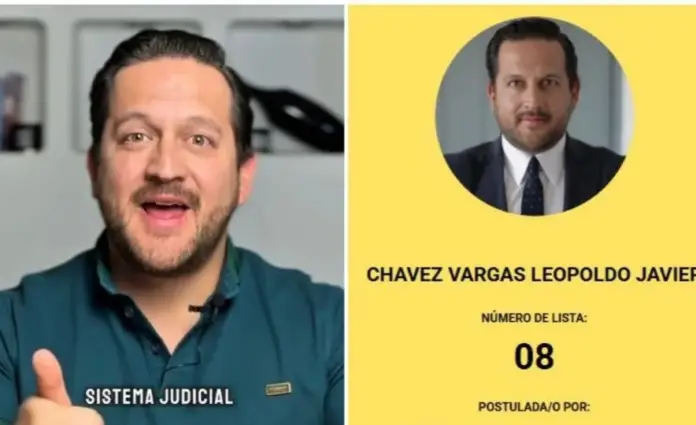Leopoldo Javier Chávez Vargas, a candidate for district judge in Durango, has been accused of allegedly having been imprisoned in the United States for drug trafficking offenses.
His name appears in the official registry of the United States Bureau of Prisons (BOP) under number 99757-379, information verified by this outlet. According to the BOP, Chávez Vargas was released on June 7, 2021, after allegedly spending almost six years in federal custody.
Why would he have been detained in the US?
According to US court documents cited by journalist Miguel Alfonso Meza, the now-candidate was detained on November 13, 2015, at the Lincoln Juárez International Bridge, while traveling on a passenger bus.
During an inspection, authorities detected a fire extinguisher hidden under his seat, inside which was a suspicious package of methamphetamine, according to the documents.
He was indicted on three federal charges: conspiracy to import methamphetamine, importation of methamphetamine, and possession with intent to distribute. In his statement, Chávez Vargas said he did not know the contents of the cylinder, which he was transporting with the intention of taking it to Dallas, Texas. He served a sentence of five years and seven months.
It should be noted that his resume contains no record of work experience prior to 2020. He is currently a legal advisor to the City Council of Nuevo Ideal, Durango.
His nomination to the Judiciary was approved by the Legislative Branch Committee. One of his proposals as a candidate is to “contribute to a judicial system that inspires confidence and combats impunity.”
Who is Leopoldo Javier Chávez Vargas?
According to his profile published on the National Electoral Institute (INE) website, he seeks to become a judge to “guarantee equal access to justice for all, with impartiality, legality, and commitment.”
He holds a law degree from the Bilingual University Institute of the State of Durango and is currently pursuing a master’s degree in Oral Trials. He also holds a diploma in Amparo Trials and participates in a seminar on business protection.
Since 2021, he has worked as a legal advisor in the municipality of Nuevo Ideal, where he provides legal support, contract review, and regulatory advice. He also works as a legal interpreter in US courts, where he translates documents and participates in court proceedings.
In 2023, he served as a financial advisor to the Gubernatorial Debate Commission of the Electoral Institute of Coahuila. Between 2020 and 2023, he was treasurer of an agricultural company, with responsibilities in financial management and tax compliance. He is fluent in English and his background includes experience in the public, private, and judicial sectors.
The debate over “narco-candidates”
The first popular election for the Judiciary in Mexico, scheduled for June 1, 2025, has been marked by controversy. A total of 881 positions will be elected, including vacancies on the Supreme Court, the Electoral Tribunal, and the new Judicial Disciplinary Tribunal.
The controversy arose after Senate President Gerardo Fernández Noroña warned about the nomination of at least 20 candidates with questionable backgrounds, including alleged ties to drug trafficking or histories as legal counsel for drug lords. According to the legislator, these profiles do not meet the probity requirement.
The Senate announced that it will file challenges before the Electoral Tribunal of the Federal Judicial Branch (TEPJF). Fernández Noroña asserted that this is not a personal veto, but rather a matter of ensuring that those who access judicial positions are qualified.
The National Electoral Institute (INE) clarified that it is not its responsibility to decide on the eligibility of candidates, but rather the Senate and the TEPJF. President Claudia Sheinbaum also asked the tribunal to invalidate candidates with alleged criminal ties.
The civil organization Defensorxs documented at least 13 candidates with a history of organized crime, sexual violence, or membership in political-religious sects. One of the most notorious cases is that of Silvia Rocío Delgado, former lawyer for Joaquín “El Chapo” Guzmán.
Various voices, from international organizations to sitting judges and civil society organizations, have warned of the risk of organized crime or political interests infiltrating the judicial system, which could compromise the independence of this unprecedented reform.

Source: lasillarota




